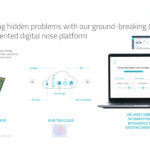What is the elevator pitch you use for your startup?
With skyrocketing fertilizer prices, a booming renewable natural gas sector and consumer trends towards transparency and ESG reporting, manure is one of the most exciting and significant opportunities in agriculture. High-tech manure processing and nutrient separation enable producers to engage in an exciting revenue dynamic as carbonnegative energy producers and fertilizer providers who are adding more net-zero food to the supply chain.
We are excited to be building out the most transformative hub and spoke revenue model that the dairy industry has ever seen. Manure processing can be innovative, and it will make the industry more economically and environmentally robust.
What pain points are you trying to solve in agriculture?
In response to the conscious consumer demand to move towards a low-carbon future, Livestock Water Recycling’s (LWR’s) solution re-imagines manure handling to create regenerative, restorative and sustainable food production in such a way that it can also be more profitable for the producer. We are able to manage the high volume of manure associated with livestock operations while separating and optimizing the nutrient content, specifically phosphorus and nitrogen. The solid our system produces also captures the volatiles necessary for producing renewable natural gas.
Specifically, the management of manure in storage lagoons is one of the most difficult, expensive and potentially limiting problems facing the agricultural industry today. This problem is particularly prevalent among large livestock operations, including dairy and swine. It is also an area of tremendous opportunity as the costs associated with manure management is high, and there is inherent fertilizer value in manure. The recovery of this value is impeded by the dilute nature of the liquids and the co-mingling of the fertilizers.
Manure is typically stored in earthen ponds or lagoons. Enclosed storage and treatment facilities for odor control, such as those used at municipal treatment plants, are too expensive to be practical for an agricultural operation. Therefore, hog and dairy operations are forced to rely on the lagoon system. The material in the lagoons is too diluted for significant anaerobic digestion and does not result in adequately treated waste.
Areas of concern for livestock producers are the constant supply of clean water, the costs associated with land and land spreading, the costs of lagoons and nuisance odor complaints. In addition, legislation continues to tighten air and water discharge levels of pollutants such as ammonia, phosphorus and methane. Most producers recognize the fertilizer value of the manure but do not have an optimum system for recovering that value or managing the nutrients in the manure. LWR makes recovering that value a reality for the farm.
LWR’s PLANT system provides protein producers the ability to increase production by providing them with a cost-effective solution to manage increases in waste in a sustainable and value-producing manner.
How did you get the idea to start your company?
LWR’s founding team has worked together for 20+ years in previous commercialization in the oil and gas water treatment market. Over a decade ago, IWR Technologies Ltd. was approached by an Alberta hog farmer who was struggling with his manure storage lagoon. This led the company to begin examining the environmental and economic impacts of manure management and agricultural wastewater treatment. The result of this extensive work is LWR, a division of IWR Technologies Ltd. that is focused on water treatment for animal agriculture, protein producers and the biogas market.
What are your plans to work with the Grand Farm?
We would welcome the opportunity to conduct crop growth trials to determine the difference between using manure-based fertilizers and biogas digestate from our manure processing systems when compared to using conventional commercial fertilizers. We have seen great results on individual farms given the highvalue nutrients and micronutrients, but would like to further validate that.
What are your plans for the US market? Do you think you’ll have a presence in the midwest?
LWR’s value proposition has been validated by multiple US farms with systems in continuous operation for over five years. LWR has sold 32 systems in over 12 American states with an installation in Northern Ireland and on the largest dairy farm in Lebanon. LWR is the first company in the world to digitize manure after analyzing thousands of data points. LWR’s equipment is targeted to livestock producers and biogas project developers. One of our installations is being verified as a generator of carbon credits, which is very exciting.
If your product/service was already being used by everyone, globally, what impact would that have?
LWR’s climate-smart technology platform converts manure, paunch, digestate and/or food processing waste into high-value products that can be sold into the circular economy. These include fertilizers, biogas feedstock and recycled clean water. 100% of waste liquids are transformed, including up to 75% recycled back into clean water. Feed crop yields are typically increased between 30-50%, and producers can reduce greenhouse gas emissions by up to 82%. In fact, LWR estimates that 300,000 tons of CO2e were mitigated by their customers in 2021.
To put that into perspective, that’s comparable to the carbon sequestered by 285,463 acres of forest (that’s over 4.2 million tennis courts worth of forest)! An LWR customer in Washington state is currently becoming Carbon Credit Verified to receive carbon credits for his installation, and we expect more farms to begin taking advantage of that opportunity. If we could put our systems across the globe, the impact would be substantial.
How are you incorporating growers into your business plan?
Growers are potential clients for processed manure fertilizers, which can be spread as a solid or put through irrigation.
Where do you see your company in 10 years?
LWR PLANTS operating in the market already have the potential to treat over one billion gallons of manure annually, and can recover over half a billion gallons of clean, reusable water: the equivalent consumption of 15,000 Americans! Our goal is to transform one trillion gallons of manure and food waste bioliquids into recycled clean water by 2030, directly impacting 10 of the UN’s Sustainable Development goals.
This magazine reaches 16,000+ farmers. In one sentence, what would you like to tell them?
LWR creates a waste-to-worth value proposition for dairy and meat producers by reducing the expense and environmental impact of waste liquids. A patented manure processing system transforms manure and bioliquids into high-value products, including fertilizer, biogas feedstock and clean water, that can be reused on the farm or sold into the circular economy.

403.203.4972
livestockwaterrecycling.com
7920 56th Street SE
Calgary, Alberta Canada T2C 4S9




